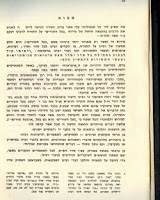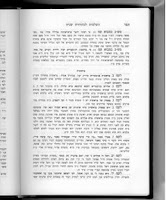Parshanut: English Translations of Medieval and Modern Rabbinic Bible Commentary (Exegetical, Philosophic, Kabbalistic and Hasidic)
Yisrael Dubitsky*
Commentaries are arranged in chronological order, and then by book. For space and simplicity sake, works are identified only by their author’s and translator’s names or publishers; for further bibliographical information, copy and paste the call numbers into the JTS online catalog under “Search: Call Number begins with…” Items not (yet?) found in the JTS Library do not have call numbers associated with them and contain instead only basic bibliographic information. Only significantly lengthy (more than a chapter or two) and systematic translations are included. Unless delimited otherwise, items cover the entire book, number of volumes notwithstanding (e.g. 4 vols on the five books of Torah). Items marked “currently…” imply a work in progress. Paraphrases, anthologies or digests of translations, such as are found in the Hertz, Soncino Press, Judaica Press, ArtScroll, Living Torah and Living Nach or Etz Hayim bible commentaries, are not included. Condensed versions, as are sometimes found in Munk translations, are included. The JPS Commentators Bible (so far on Exodus alone), in addition to its systematic translation of four major commentators, also occasionally includes selections from Bekhor Shor, Radak, Hizkuni, Gersonides, Abarbanel and Sforno. These latter have not been included in the list. Further, academic or modern critical commentaries, even those written by rabbis, are excluded. Finally, no implication regarding quality of the translation should be drawn from inclusion in this list.
Medieval
I. Sa`adiah ben Joseph Gaon [882-942]
A. Torah
1. Linetsky [Gen 1-28] BS1235.X2 S213 2002
B. Job
1. Goodman BS1415.2. S143 1988
C. Daniel 1. Alobaidi (Bern; NY: Peter Lang, 2006)
II. Rabenu Hananel ben Hushiel [d. 1055/6]
A. Torah
1. Munk BS1225.X2 M8 2003 6 vols.
III. Rashi [Solomon ben Isaac, 1041-1105]
A. Bible
1. Rosenberg
B. Torah
1. Lowe [only on Gen] BS1235.X2 S62 L6
2. Doron [Gen 1-6] BS1235.3. D6 1982
3. Rosenbaum/Silbermann BS1222 1934 5 vols.
4. Ben-Isaiah/Sharfman BS1222 1949 5 vols.
5. Metsudah BS1222 1991 5 vols.
5a. Online
6. Milstein BM724. V5 1993 10 vols.
7. Artscroll (Herczeg) BS1225.X2 S6 1994 5 vols.
8. Feldman et al (“Ariel Chumash”) [currently on Gen] (Jerusalem: United Israel Institute, 1997) 2 vols.
9. Moore [currently on Gen] BS1225.X2 S6 M66 2002
10. JPS (Carasik) [currently on Ex] BS1223. C3713 2005
C. Joshua
1. Davis (Metsudah) BS1292. D28 1997
D. Judges
1. Rabinowitz/Davis (Metsudah) BS1302. D28 2001
E. Samuel
1. Pupko/Davis (Metsudah) BS1322. D28 1999 2 vols.
F. Kings
1. Pupko/Davis (Metsudah) BS1335.3. D38 2001 2 vols.
G. Psalms
1. Gruber BS1429.X2 S26 1998
H. Five Scrolls
1. Schwartz [Esther, Canticles, Ruth] BS1309. A2S3
2. Davis/Pupko (Metsudah) BS1309. A2M4 2001
I. Ruth
1. Beattie BS1315.2. B4
IV. Rashbam [Samuel ben Meir, ca. 1080-1174]
A. Torah
1. Lockshin BS1225.X2 S2313 1989 4 vols.
2. Munk BS1225.X2 M8 2003 6 vols.
3. JPS (Carasik) [currently on Ex] BS1223. C3713 2005
B. Ecclesiastes
1. Japhet/Salters BS1475.X2 S2713 1985
C. Canticles
1. Thompson BS1485.X2 S26 T5 1988
V. Abraham ben Meir Ibn Ezra [1092-1167]
A. Torah
1. Oles [Gen] (PhD, HUC, 1960)
2. Linetsky [Gen 1-6] BS1235. I36513 1998
3. Shachter [Lev, Deut] BS1225.X2 I3513 1986
4. Strickman BS1225.X2 I3513 1988 5 vols.
5. JPS (Carasik) [currently on Ex] BS1223. C3713 2005
6. Benyowitz (Jerusalem: A.R. Benyowitz, 2006) 3 vols.
B. Isaiah
1. Friedlander BS1515. I2 1964 (1873)
C. Hosea
1. Lipshitz BS1565.X2 I213 1988
D. Psalms
1. Strickman [currently on Pss 1-41] (NY: Yashar, 2007)
E. Ruth
1. Beattie BS1315.2. B4
VI. Moses ben Shesheth [fl. ca. 1190-1200?]
A. Jeremiah/Ezekiel
1. Driver BS1525. M65 18711a.
VII. Radak [David ben Joseph Kimhi, ca. 1160-ca. 1235]
A. Torah
1. Munk BS1225.X2 M8 2003 6 vols.
B. Isaiah
1. Cohen [Isa 40-66] BS1520.X2 K5 1954
C. Zechariah
1. M’Caul BS1665.X2 K513 18371a. online
D. Psalms
1. Greenup [Pss 1-8] (London Palestine House, Hackney, 1918)
2. Finch [Pss 1-10, 15-17, 19, 22, 24] BS1429.X2 K55
3. Baker/Nicholson [Pss 120-150] BS1429.X2 K54 1973
(E. Ruth?)
1. Beattie BS1315.2. B4
F. Chronicles
1. Berger (PhD, YU, 2003)
VIII. Ezra ben Solomon of Gerona [d. ca. 1238]
A. Canticles
1. Brody BS1485.X2 M632 1999
IX. Ramban [Moses ben Nahman = Nachmanides, ca. 1195-ca. 1270]
A. Torah
1. Chavel BS1225.X2 M6613 5 vols.
2. Artscroll [currently Gen-Ex] BS1225.X2 M68 B7 2004 4 vols.
3. JPS (Carasik) [currently on Ex] BS1223. C3713 2005
B. Ecclesiastes
1. Chavel BM45. M6313 1978 v. 1
X. Shem Tov ben Joseph Falaquera [ca. 1225–1295]
A. (Torah)
1. Jospe B759.F334 J68 1988
XI. Zohar [ca. 1280]
A.Torah
1. Sperling/Simon (Soncino) BM525 .A52 1931 5 vols.
2. Matt (“Pritzker edition”) [currently on Gen] BM525.A52 M37 2004 3 vols.
XII. Midrash ha-Ne`elam (Zohar) [ca. 1280]
A. Ruth
1. Englander/Basser BM525.A6 M513 1993
XIII. Unknown (Anonymous, probably compilatory) [13th cen]
A. Job
1. Hirsch BS1415.C5813 1905
XIV. Ba`al ha-Turim [= Jacob ben Asher, ca. 1269-ca. 1340]
A. Torah
1. Artscroll BS1225.X2 J232 1999 5 vols.
2. Munk BS1225.X2 J2313 2005 4 vols.
XV. Gevi`a Kesef [= Joseph ben Abba Mari Ibn Kaspi, 1279–1340]
A. Genesis
1. Herring B759. C37K4 Z31
XVI. Ralbag [Levi ben Gershom = Gersonides, 1288-1344]
A. Job
1. Lassen BS1415.X2 L4 L3
B. Canticles
1. Kellner BS1485. L39 1998
XVII. Rabenu Bahya ben Asher ben Hlava [d. 1340]
A. Torah
1. Munk BS1225.X31 B2313 1998/2003 7 vols.
XVIII. Abraham ben Isaac ha-Levi TaMaKH [d. 1393]
A. Canticles
1. Feldman BS1485.X2 A24 1970
XIX. Avvat Nefesh [Unknown, end of 14th cen]
A. Genesis
1. Gartig BS1225.X2 I35 G37 1995
XX. Akedat Yitshak [= Isaac ben Moses Arama, ca. 1420-1494]
A. Torah
1. Munk BS1225.X3 A7 2001 2 vols.
XXI. Obadiah ben Jacob Sforno [ca. 1470-ca. 1550]
A. Torah
1. Stahl [Deut] (PhD, HUC, 1975)
2. Artscroll BS1225.X2 S4413 1987/1997 2/1 vols.
3. Munk BS1225.X2 M8 2003 6 vols.
(Pre-)Modern
XXII. Moses Alshekh [1507-1593]
A. Torah
1. Munk BS1225.X2 A4313 2000 3 vols.
B. Jonah
1. Shahar BS1605.3. A413 1992
C. Psalms
1. Munk BS1429.X31 A4213 1990 2 vols.
D. Proverbs
1. Munk BS1465.X31 A413 1991
2. Hirshfeld/Braude (Nanuet, NY: Feldheim, 2006) 2 vols.
E. Job
1. Shahar (Nanuet, NY: Feldheim, 1996) 2 vols.
F. Ruth
1. Shahar/Oschry BS1315.X31 A4213 1991
G. Esther
1. Honig BS1375.X31 A413 1993 2 vols.
H. Lamentations
1. Hirshfeld BS1535.X31 A5513 1993
I. Canticles
1. Shahar BS1485.X31 A4813 1993
J. Ecclesiastes
1. Shahar BS1475.3. A413 1992
K. Daniel
1. Shahar/Oratz/Hirshfeld (Jerusalem: Feldheim, 1994)
XXIII. Eliezer ben Elijah Ashkenazi [1512-1585]
A. Esther
1. Brown (PhD, BHU, 2006)
XXIV. Keli Yakar [= Ephraim Solomon ben Aaron, of Luntshits (Lenczycza), 1550-1619]
A. Torah
1. Levine [currently on Ex] BS1225.X31 E6913 2002 2 vols.
2. Kanter [Deut] BS1225.X31 E6913 2003 v. 5
XXV. Tze’enah u-Re’enah [= Jacob ben Isaac Ashkenazi of Janow, 1550-1628]
A. Torah
1. Hershon [Gen] BS1235. J3 1885
2. Artscroll [Torah & Scrolls] BS1225. J259 1983 3 vols.
XXVI. Shlah [Shene Luhot Ha-berit = Isaiah Horowitz, ca. 1565-1630]
A. Torah
1. Munk BS1225.X33 H613 1999 3 vols.
XXVII. Me`am Loez [= Jacob Culi, d. 1732]
A. Bible [excluding Ezek; Job; Ezra-Neh; Dan; Chronicles]
1. Kaplan et al. BS1158. H4C8 1978 43 vols.
XXVIII. Or ha-Hayim [= Hayyim ben Moses Attar, 1696-1743]
A. Torah
1. Munk BS1225.X2 I28613 1995 5 vols.
XXIX. Hatam Sofer [= Moses Sofer, 1762-1839]
A. Torah
1. Stern [currently Gen-Lev] BS1225.X31 S3513 1996 3 vols.
XXX. Ha-Ketav veha-Kabalah [= Jacob Zevi Hirsch Meklenberg, 1785-1865]
A. Torah
1. Munk BS1225.X31 M3813 2001 7 vols.
XXXI. Shadal [Samuel David Luzzatto, 1800-1865]
A. Torah
1. Klein [currently on Gen] BS1235.3. L89 1998
XXXII. Samson Raphael Hirsch [1808-1888]
A. Torah
1. Levy BS1222 1958 6 vols.
2. Haberman [currently Gen-Lev] (Jerusalem: Feldheim, 2000-2005) 4 vols.
B. Psalms
1. Hirschler BS1430. H5 1978
C. Proverbs
1. Paritzky BS1465.3. H5
XXXIII. Malbim [Meir Loeb ben Jehiel Michael Weiser, 1809-1879]
A. Torah
1. Faier [through Ex 12] BS1225. M313 5 vols.
B. Proverbs
1. Wengrov/Zornberg BS1555. M34
C. Job
1. Pfeffer BS1415. M35 P44 2003
D. Esther
1. Taub BS1375.5. T28 1998
2. Weinbach BS1375.5. W4E. Ruth 1. Kurtz (New York: Feldheim, 1999)
XXXIV. Netziv [Naphtali Zvi Yehudah Berlin, 1817-1893]
A. Canticles
1. Landesman BS1485.X2 B4413 1993
[1a. (second part) Joseph BM560. B42513 1996 ]
XXXV. Bet Ha-Levi [= Joseph Baer Soloveichik, 1820-1892]
A. Torah
1. Herczeg [currently Gen – Ex] BS1225.X3 S63513 1990 2 vols.
XXXVI. Joseph Breuer [1882-1980]
A. Jeremiah
1. Hirschler BS1522 1988
B. Ezekiel
1. Hirschler BS1543. H57 1993
XXXVII. Nechama Lebowitz [1905-1997]
A. Torah
1. Newman BS1193. L521 5 vols.
XXXVIII. Da`at Sofrim [= Chaim Dov Rabinowitz, 1909-2001]
A. Bible
1. Starrett [currently on Jos-Jud; Sam; Kgs; Isa; Jer; Ezk; 12; Job; Chr; Dan-Neh] BS1151.2. R33 2001 10 vols.
Hasidic:
XXXIX. Menachem Mendel of Rimanov [1745-1815]
A. Torah
1. Levine BS1225. R9513 1996
XL. Mei ha-Shiloah [= Mordecai Joseph Leiner, 1802-1854]
A. Torah
1. Edwards BS1158.H4 X31 L413 2001
XLI. Sefat Emet [= Judah Aryeh Leib Alter, 1847-1905]
A. Torah
1. Green BS1225.X34 A39713 1998
* Yisrael Dubitsky served as Public Services and Research Librarian at The Library of the Jewish Theological Seminary until March 2007. He recently made aliyah and currently works part-time for the Saul Lieberman Institute as well as the Igud le-Farshanut ha-Talmud. He can be reached at yidubitsky-at-gmail -dot-com.






